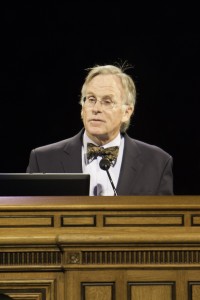Three key elements to the Founding Fathers’ success during the Constitutional Convention of 1787 were secrecy, a small work place and a variety of leadership, according to Richard Beeman, who addressed BYU students at Tuesday’s forum assembly.

Beeman is the John Welsh Centennial Professor of History at the University of Pennsylvania. His address was titled, “The Founding Fathers of 1787: Lessons in Political Leadership.” Regarding how 55 diverse men gathered in Pennsylvania, representing individual states, Beeman addressed how they managed to be successful in the signing of the Constitution that year.
The first key to the Founding Fathers’ success, according to Beeman, was that they met in secret and that secrecy was remarkably enforced. Beeman said this allowed the delegates at the Constitutional Convention of 1787 to engage in fiercely real conversation, including heated arguments and disagreements.
Beeman explained the drinking binges the delegates would go on to tame some of the contention in the work place. He illustrated this by sharing a bill received three days prior to the signing of the Constitution from a tavern for a large sum of money due to the amount of alcohol the delegates consumed. He lightly added that he was not saying alcohol consumption was a good way to foster a relationship with others, which BYU students received with laughter. He asked students to consider what the atmosphere would be like if a constitutional convention were held in America today.
“Alcohol aside, the atmosphere of collegiality among Framers was dramatically different than that in our current atmosphere,” Beeman said.
The second element Beeman attributed to the success of the Founding Fathers was the extremely small space in which delegates worked. He said the room was 40 feet by 40 feet, which made it difficult to whisper without being overheard. Beeman suggested that perhaps civility was more highly valued during this time than it is today. He believes this small space enforced collegiality and fostered an atmosphere that would not be easily replicated today.
“The fostering of convivial relationships among our political leaders is incredibly important to our political process,” Beeman said. “And nearly entirely absent, alas, from our current Congress.”
Third, Beeman suggested that the variety of leadership among delegates contributed to the success of the convention in a way that success may not be possible among today’s political leadership realm. He noted several qualities that were important to building the Constitution.
“Cooperation, forbearance and competition were every bit as brilliant as the business in Constitution making,” he said.
Beeman highlighted several of the Founding Fathers and the strengths their leadership brought to the historic convention of 1787. These men included James Madison, James Wilson, Gouverneur Morris, Roger Sherman, George Washington and Benjamin Franklin. He spoke of many of the weaknesses of these men but that they did not let those overshadow their strengths.
Beeman highlighted Washington’s presence and Franklin’s zeal. That vigor ultimately led to the success of the signing of the Constitution despite the many objections, prejudices, opinions and selfish views.
He quoted Franklin as saying, “Doubt a little of your own infallibility and affix your signature to the document in spite of your objections.”
Beeman used Franklin’s words as a springboard for his hopes for the political leadership of the United States.
“It does indeed seem that all of us have much to learn from the collective wisdom and humility displayed by those men who spent that summer in Philadelphia,” Beeman said. “We can only hope that our political leadership will have … the wisdom not to allow the perfect to become the enemy of the good. We can only hope that our political leaders today observe that particular lesson in leadership from Benjamin Franklin, the oldest of our Founding Fathers.”




